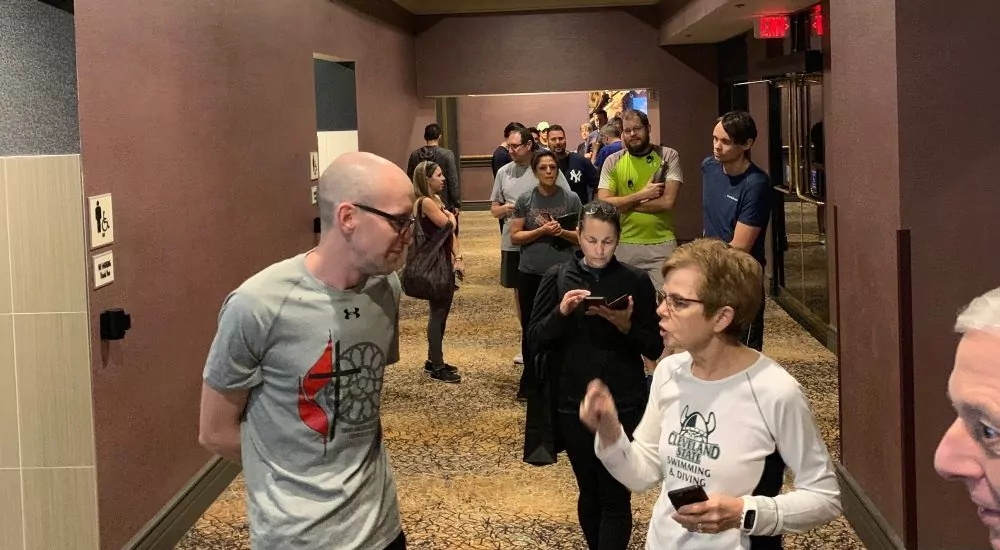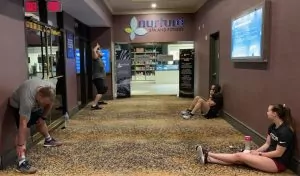- January 24, 2019
- Posted by: Hillary Feder
- Category: Customer Engagement

Las Vegas. In the 24/7 City known for gambling, the odds are in favor of the house at the tables. But betting that visitors will tolerate a lack of service may prove to be the biggest risk of all, with a proliferation of casinos nationwide. My experiences point to the real sin in Sin City and some tips for doubling down on customer experience.
The lead
Well aware that travel can disrupt my health routine with tempting food choices and lack of exercise, I had committed to stay on track during my last trip—a week in Las Vegas for a tradeshow. I was resolved to exercise early each morning before starting my business day.
Imagine how disappointed I was when I arrived at 6:08 Monday morning at the hotel gym only to find that every piece of equipment was being used. While waiting, I grabbed a mat for stretching and crunching. The elliptical trainer was vacated first, and although it is my least favorite way to exercise, I hopped on to accomplish my mission.
 To have a shot at the treadmill or bike the next day, I arrived at the gym at 5:20 a.m., only to find I was fifth in line waiting for the gym to open (others had arrived as early as 5!). I had missed the sign “Gym hours: 6 a.m. to 6 p.m.” By the time the gym opened, there was a huge line, and many had to wait for equipment. While commiserating about the restrictive gym hours with my workout buddies, I learned that everyone was staying at the hotel for the same conference.
To have a shot at the treadmill or bike the next day, I arrived at the gym at 5:20 a.m., only to find I was fifth in line waiting for the gym to open (others had arrived as early as 5!). I had missed the sign “Gym hours: 6 a.m. to 6 p.m.” By the time the gym opened, there was a huge line, and many had to wait for equipment. While commiserating about the restrictive gym hours with my workout buddies, I learned that everyone was staying at the hotel for the same conference.
Based on a Las Vegas Convention and Visitor Authority study, out of the city’s approximately 38-39 million visitors, 11% come for a trade show or convention and another 6% for other business.
You would think these statistics would encourage hotels to offer either extended hours or unrestricted access. Yet when I checked other hotels as well as the convention center, those gyms open at 6 a.m., too.
Back story
My Vegas woes actually date back to 2016 when I became ill at the same show (not lucky in Vegas, I guess). It took every failing part of me to drag my body from the trade show floor and crawl into my hotel room bed. At around 9 pm, I realized I was starving and dehydrated, but not confident about leaving the room. When I called room service, I was told that hours were 7 a.m.—1p.m.
As a Plan B, I called the café, thinking I’d pay a wait staff person handsomely to bring tea, toast and juice to me. Well, it’s against hotel policy for the restaurants to bring food to guest rooms. Weak and frustrated, I crawled back into bed. At 6 a.m. the next morning, I forced myself to get dressed and go to the café, resentful that room servicewould not open for another hour.
Raise the bar
To build a first-class customer experience, you need to understand what’s important to your customers. Here are a few tips:
#1 Ask. Listen. Learn.
Be open to suggestions when you ask if there is anything about your customers’ experience they would change. Listen intently for the small details. You may need to ask the question a couple of times in a couple of different ways to convince customers of your sincerity in trying to improve.
How you ask questions is important too. A colleague recently expressed disappointment over a 2% response to an annual email survey. With 3,000 clients, he felt calling was impossible. Consider creating a valid cross section/matrix of your clients and surveying a small portion in a more meaningful way for a more informative response.
When I complained about limited room service hours, I heard, “We want guests out of their room and in the casino.” That’s a clear message that the hotel’s bottom line comes before guests’ needs.
The hotel gym could offer a 24/7 self-service option with access via a room key.
#2 Use foresight to aim high.
Give them more than what they ask for. Look for how emerging trends could impact your client experience. Anticipating changing needs demonstrates a keen interest in their perspective. Consider focus groups to gain insights.
Preventive health care and longevity, including eating and exercise, are huge topics. The person who opens the gym no doubt has informed the hotel of how the line to get in at 6 a.m. has grown over the last few years. But beyond gym and room service hours that don’t meet guests’ needs, the hotels could learn about preferred equipment and food choices by doing a long-haul guest survey.
#3 Express appreciation often.
This can come in the form of a simple, handwritten thank you or verbal expression.
Three elements make a thank you meaningful:
- Be specific – what specifically happened that you are expressing thanks/appreciation for and how did it benefit you or your company
- Be authentic – people often have a sixth sense that sniffs out insincerity
- Be timely – saying thank you in a timely fashion to the action is extends the moment.
Unexpected extras make an impact. When I called room service and explained I had the flu, it was clear that the person on the other end was not empowered to make discretionary exceptions. Had they been, I would have written the GM a glowing testimonial and been a staunch brand ambassador for that hotel. It’s personal stories like this – especially on today’s digital communication channels – that can build a strong reputation.
Every business has competition. Building a nurturing strategy that “shows your customers love” beyond the transaction and forms an intentional client experience will insulate your business from customer attrition.
If you need help developing a customer experience that is aligned to your values and brand, let’s start a conversation.
Toll free: 800-742-6800 In Minneapolis/St. Paul: 952-933-8365 email: Hillary@askhillarys.com
